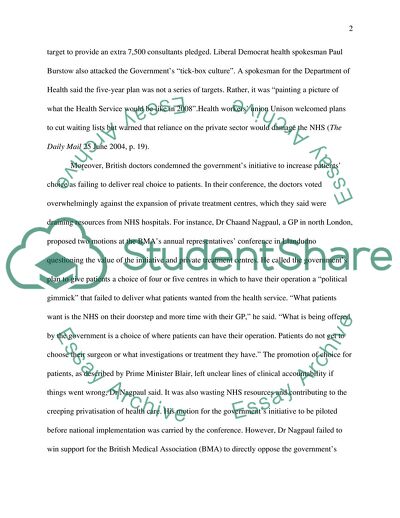
- Home
- Free Samples
- Premium Essays
- Editing Services
- Extra Tools
- Essay Writing Help
- About Us
- Studentshare
- Subjects
- Miscellaneous
- NHS improvement plan 2004 states: By 2008, the independent sector will provide up to 15% of procedures on behalf of NHS
NHS improvement plan 2004 states: By 2008, the independent sector will provide up to 15% of procedures on behalf of NHS - Essay Example

- Subject: Miscellaneous
- Type: Essay
- Level: Undergraduate
- Pages: 4 (1000 words)
- Downloads: 0
- Author: ramon14
Extract of sample "NHS improvement plan 2004 states: By 2008, the independent sector will provide up to 15% of procedures on behalf of NHS"
The NHS Improvement Plan outlined the policy on empowering patients and we will be giving further details in due course. The Department of Health will support the development and application of decision aids that support patients and help them to make the right choices (Doctor, 25 October 2005). The idea was to have care needs rooted in primary care settings and underpinned by improved communication with new partnerships across the health and social care spectrums (Elliot, 19 August 2005). However, the one clause of the NHS Improvement Plan 2004 had been a cause for debate.
It indicated that private firms will be carrying out up to 15 per cent of all NHS operations. This will amount to one million every year. In 2004, they perform just 100,000. Thus, those NHS hospitals which fail to attract patients could be forced to close. This led to fears that communities could be left without a local trust. Private firms will also provide more diagnostic services such as MRI scans and radiotherapy services and will even be able to set up their own GP surgeries to treat NHS patients.
The proposals drew sharp criticism from the Tories, who said Labour had already failed to meet many other pledges to improve the NHS. It had failed to end the postcode lottery for prescribing cancer drugs and is likely to have missed a target to provide an extra 7,500 consultants pledged. Liberal Democrat health spokesman Paul Burstow also attacked the Government’s “tick-box culture”. A spokesman for the Department of Health said the five-year plan was not a series of targets. Rather, it was “painting a picture of what the Health Service would be like in 2008”.
Health workers’ union Unison welcomed plans to cut waiting lists but warned that reliance on the private sector would damage the NHS (The Daily Mail 25 June 2004, p. 19). Moreover, British doctors condemned the government’s initiative to increase patients’ choice as failing to deliver real
...Download file to see next pages Read MoreCHECK THESE SAMPLES OF NHS improvement plan 2004 states: By 2008, the independent sector will provide up to 15% of procedures on behalf of NHS
Complaints and litigation
The Role of Consultant Psychologists
The NHS Improvement Plan 2004
Assessment of an adult with high alcohol consumption
Risk Assessment by Identification of Hazard
Public Service Management
Overview of the Winterbourne View Case
Principles of Practice in ABC Care Home

- TERMS & CONDITIONS
- PRIVACY POLICY
- COOKIES POLICY